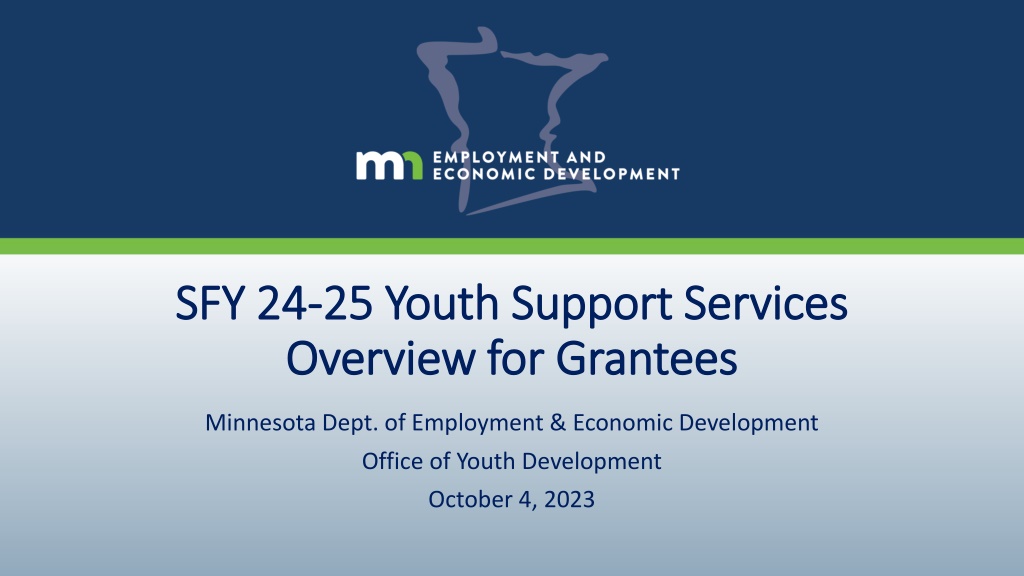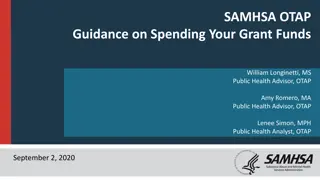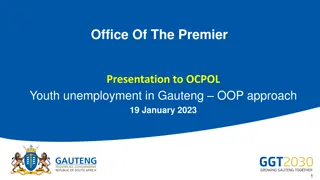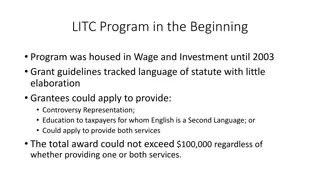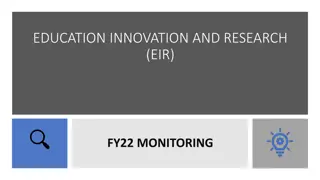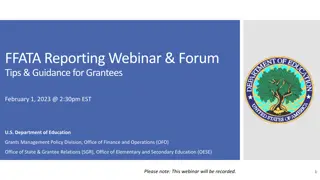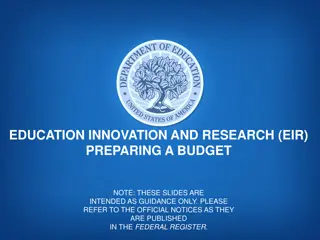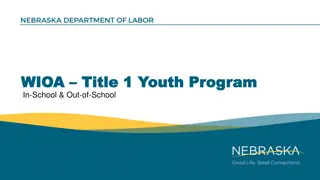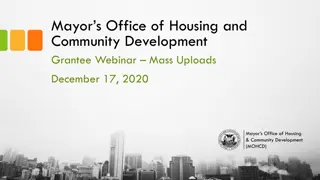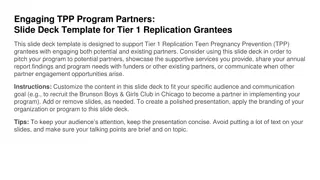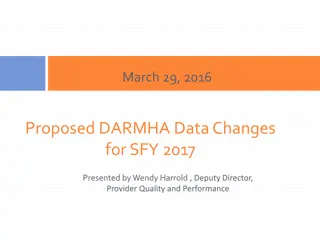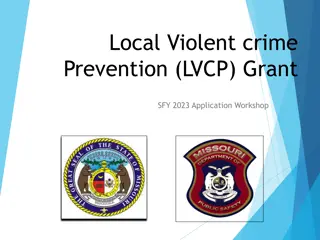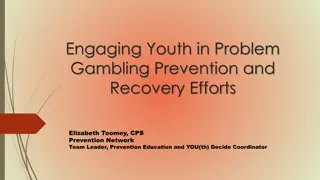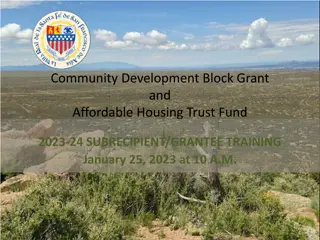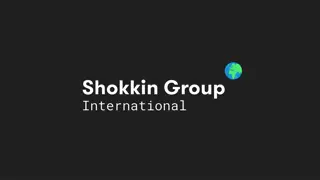SFY 24- -25 Youth Support Services Overview for Grantees
This webinar provides an overview of the Youth Support Services grant program managed by the Minnesota Department of Employment and Economic Development (DEED). The program aims to support individuals from low-income communities, young adults from families with intergenerational poverty, and communities of color by offering services such as job training, employment preparation, internships, financial literacy, and youth intervention activities. Grantees will learn about the financial expectations, reporting requirements, and technical assistance available through the program.
Download Presentation

Please find below an Image/Link to download the presentation.
The content on the website is provided AS IS for your information and personal use only. It may not be sold, licensed, or shared on other websites without obtaining consent from the author. Download presentation by click this link. If you encounter any issues during the download, it is possible that the publisher has removed the file from their server.
E N D
Presentation Transcript
SFY 24 SFY 24- -25 Youth Support Services 25 Youth Support Services Overview for Grantees Overview for Grantees Minnesota Dept. of Employment & Economic Development Office of Youth Development October 4, 2023
Outline of Todays Webinar Outline of Today s Webinar Welcome Grant Overview Overview of Financial Expectations/Requirements Workforce One Reporting Requirements Technical Assistance Q&A
Welcome Welcome Kathy Young, Program Coordinator, DEED kathy.young@state.mn.us Webinar is being recorded and a link will be sent to grantees. It will also be posted on the Youth Support Services website. Use chat box for questions or unmute and ask questions as we go We will leave time at the end for additional Questions and Answers If you have questions following the please e-mail kathy.young@state.mn.us
Grant Overview Grant Overview
DEED Overview DEED Overview The Minnesota Department of Employment and Economic Development (DEED) is committed to ensuring economic equity throughout Minnesota. Minnesotans will have fair and equitable access to meaningful employment at a family sustaining wage, and employers will be able to fill in-demand jobs. DEED s Mission: To empower the growth of the Minnesota economy, for everyone Youth Support Services grants are managed through DEED s Employment and Training Programs (ETP) Division, Office of Youth Development 5
Eligible Population Eligible Population Support Services competitive grant program provides grants to organizations that provide support services for individuals Grant services must focus on: Individuals from low-income communities, and/or Young adults (ages 14-24) from families with a history of intergenerational poverty, and/or Individuals from communities of color 6
Eligible Services Eligible Services Services provided under this grant must serve individuals from the eligible populations ( participants ) in one or more of the following areas: Job training, Employment preparation, Internships, Job assistance to parents, Financial literacy, Academic and behavioral interventions for low-performing students, and/or Youth intervention activities 7
Notes About Funding Availability Notes About Funding Availability Award is for SFY 24 and SFY 25 First year contract start on 7/1/23 (unless otherwise noted) and end 6/30/24 First year award amount is for SFY 24 and is available now Second year award, for SFY 25, is available no earlier than 7/1/24 New contract for SFY 25 award amount will be set up in the spring Submit an updated budget and work plan for SFY 25 funds next spring
Financial Expectations Financial Expectations
General Cost Guidance General Cost Guidance Costs must be as follows: Appropriately allocated Consistently applied Necessary Reasonable Allocable Incurred within the time period of the grant
Youth Support Services Cost Categories Youth Support Services Cost Categories Administration: DEED Policy 521 states that based on Minnesota Statute 16B.98, Subdivision 1, DEED limits state grantees administrative budget to no more than 10% of the award amount. If the award amount is not fully expended, the 10% amount is based on the total expenditures for the grant. Administrative costs are associated with functions not related to the direct provision of services to program participants.
Youth Support Services Cost Categories Youth Support Services Cost Categories Administration - Examples: Accounting, budgeting, financial and cash management functions Personnel management functions Payroll functions Costs of goods and services required for the administrative functions Systems and procedures required to carry out the above administrative functions including necessary monitoring and oversight
Youth Support Services Cost Categories Youth Support Services Cost Categories Direct Services to Participants: Costs associated with providing direct service to participants should be included in this cost category. Examples of such costs include: All staff (wages and fringe) for staff providing direct services to participants Job coaching or individual counseling and career planning Case management/ navigation for participants Assessments of the skill levels and service needs of participants Development of an individual employment plan or service strategy Career planning and mentoring
Youth Support Services Cost Categories Youth Support Services Cost Categories Direct Customer Training: Any tuition, books, fees, on-the-job training reimbursements, participant wages and fringes, and Personal Adjustment/Independent Living Skills Training, provided directly on the customer s/consumer s behalf. Do not include staff costs within this category unless staff are providing the direct customer training.
Youth Support Services Cost Categories Youth Support Services Cost Categories Support Services: Costs for services and items considered necessary for participation in the program including, but not limited to: Transportation, Housing/rental assistance, Child care assistance, Travel assistance, Personal technology, clothing, tools, etc. These expenses may be paid directly to the participant or to a third- party vendor.
Reimbursements Reimbursements Usual method of payment on DEED grants is through reimbursement based on actual expenditures incurred. ALL documentation for reimbursements should be retained and made available upon request. Requests for reimbursements need to align with grant legislation, DEED s Request for Proposal, your organization s approved and executed contract, work plan, and budget, Office of Grants Management policies, DEED policies, and the granted organization s policies and procedures.
Reimbursements Reimbursements The Reimbursement Payment Requests (RPRs) should be submitted every month whether there are expenditures or not. Use the form that DEED s provides with your contract. PLEASE do not modify this spreadsheet or any of the prepopulated information on it. Report expenditures by cost category according to approved budget There must be a separation of duty. The person preparing and authorizing the form must be two different people. Both the preparer and the authorizer must sign the form where indicated.
Reimbursements Reimbursements Expenditures in a cost category may not exceed the approved budget for that category. The approved budget amounts on the RPR can only be changed through a modification to the contract, with prior DEED approval. The completed RPR must be submitted to the DEED.FSR@state.mn.us e-mail account on or before the 20th of the month, for the previous month. Example: January RPR is due by February 20th Before submitting, check for correct sums, correct budget categories, and both authorized signatures Only the final RPR should be marked as Final
Workforce One Workforce One
What is WF1? What is WF1? Workforce One (WF1) is a web-based case management system for employment and training programs. Approximately 2,000 staff working for cities, counties, non-profits, and the State of Minnesota use it to track services for many state and federally-funded workforce programs. This includes state-funded competitive grants. www.mnworkforceone.com
What will you do with WF1? What will you do with WF1? Enter applications, eligibility determinations, and enrollment information that is collected at program intake. This data is entered once per case and not updated later unless there are changes in address, phone number, e-mail, etc. Add activities to represent the services you are providing to each participant on an ongoing basis. This includes closing activities that are done and indicating whether they were successful. Enter case notes to capture contact with participants and to provide the ongoing story of what you are doing to serve the customer. Track outcomes Exit customers who have completed services
How will DEED use your data in WF1? How will DEED use your data in WF1? Grant administrators at DEED will use WF1 to determine: If you are enrolling participants at the rate you planned (enrollment); Whether the services you are providing are justified and appropriate (activities); If you are staying in frequent contact with your participants (case notes); and Whether you are exiting participants who have completed services in a timely fashion and whether you have achieved the program objectives with those exits (exit). The data you enter in WF1 will also be used to calculate your organization s outcomes. This information is available to the general public, the Legislature and other stakeholders.
WorkForce One: Setup WorkForce One: Setup The Youth Support Services grant will have a Custom Program in WF1 We are working to get the program set up for the SFY 24 grants Each Youth Support Services grantee will need a WF1 organization account Grantee program staff that are responsible for entering information in WF1 will need an individual staff account Existing staff accounts will need to be linked to the YSS Custom Program DEED staff will notify grantees once the Custom Program is set up
WorkForce One: Training WorkForce One: Training Training will be provided to grantees at no cost. Training options include: Recording of full case management training: This training has been recorded and is available in two parts on the Information for Providers tab. Recordings of short videos on specific topics: currently there are videos on Case Notes, Activity, and Plan topics, with plans to add additional topics such as Person Search, Application, Eligibility, etc. Access these videos by logging into Workforce One, then select Resources and User How-to Guides. If you select the column heading Category , all the videos will appear at the top of the list. Live Virtual Training: to register, log into Workforce One and select Resources, then Staff Training. You can register for upcoming trainings that have available space, or add your name to the wait list if the class is full.
Reporting Requirements Reporting Requirements
Reporting Requirements: Quarterly Report Reporting Requirements: Quarterly Report Quarterly Progress Reports provide data and narrative updates Reports are due 30 days after the end of the calendar quarter. Use Quarterly Report template (provided with executed contract) SFY 24 Reports Due: October 30, January 30, April 30, and July 30 Report cumulative for the SFY Emailed to Program Manager: kathy.young@state.mn.us Three sections Group Services Individual Services Data Narrative
Reporting Requirements: Quarterly Report Reporting Requirements: Quarterly Report Group Services: Number served through Group Activities Group Activities examples: Career fair, presentations to classes, one-time training or intervention, tours or presentations by employers Not case-managed participants, Not reported in Workforce One Participants could be counted in group services and individual services Describe activities provided, if applicable Not applicable for some programs or in some quarters
Reporting Requirements: Quarterly Report Reporting Requirements: Quarterly Report Individual Services: Receiving case managed/individual services Report on the number of individuals served, cumulative for the SFY Align with work plan and data entered in Workforce One Data section includes Demographics Age, race, education level, etc. Other Demographics Barriers to employment: limited English proficiency, disability, homeless, former foster youth Indicators of economic condition: economically disadvantaged, receiving public assistance Program services, activities, other related assistance Indicators of Performance (Outcomes) Customer satisfaction Could be not applicable" for some quarters
Reporting Requirements: Quarterly Report Reporting Requirements: Quarterly Report Narrative: Short summary of activities and progress Description of any changes or challenges in implementing grant project Include project highlight or Success Stories Only use first names in stories DEED has Media Release forms that must be used with success stories and any reports you generate that include individual profiles and/or images. Success Stories are used in program factsheets and reports to the Legislature and general public Thorough narratives help to tell the stories of the great work that is happening through these grants
Data Privacy and Equal Opportunity Data Privacy and Equal Opportunity Grantees must inform program participants how their personal information will be used Applicants and participants must also be informed of their right to file a complaint of discrimination How We Use Your Personal Information/Equal Opportunity is the Law document may be customized with your agency information.
Technical Assistance Technical Assistance
Technical Assistance Technical Assistance Ongoing technical assistance available from DEED s Program Manager Data reporting questions or Work Force One access RPRs and expenditure reporting questions Grant overview for new staff Important to contact your DEED program manager with any issues that may impact your grant and potentially require a contract modification Potential reasons for a contract modification could include: Need to move funds between cost categories (DEED cannot reimburse in excess of the approved budget for any cost category) Changes to previously approved work plans Change in organization name or change in personnel of authorized signatory
Technical Assistance Technical Assistance Resources for Grantees are posted on Youth Support Services webpage https://mn.gov/deed/programs-services/office-youth- development/special/youth-support/ If you have any questions about your grant or the information presented today, please email Kathy Young (kathy.young@state.mn.us) We look forward to working with you as you implement your Youth Support Services Project!
